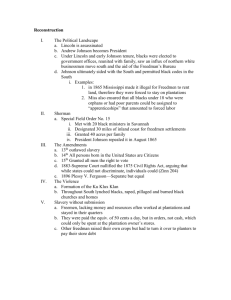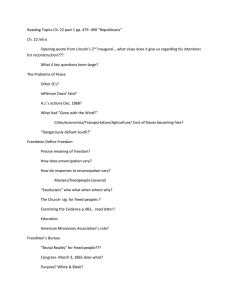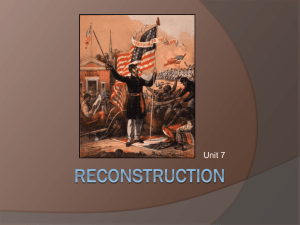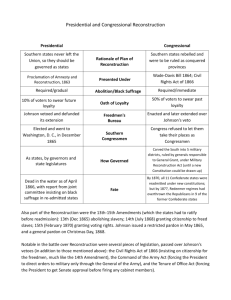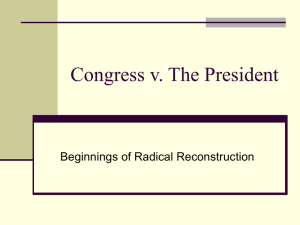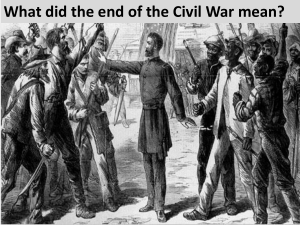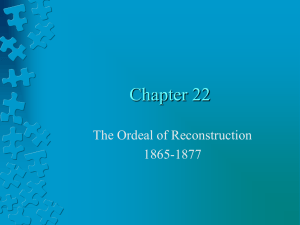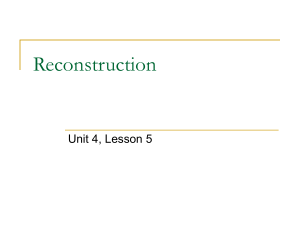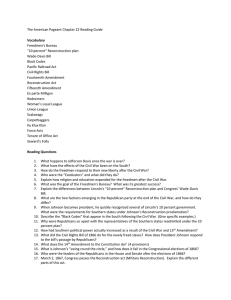Hist 202 Q's for: "Reconstruction Part I"
advertisement
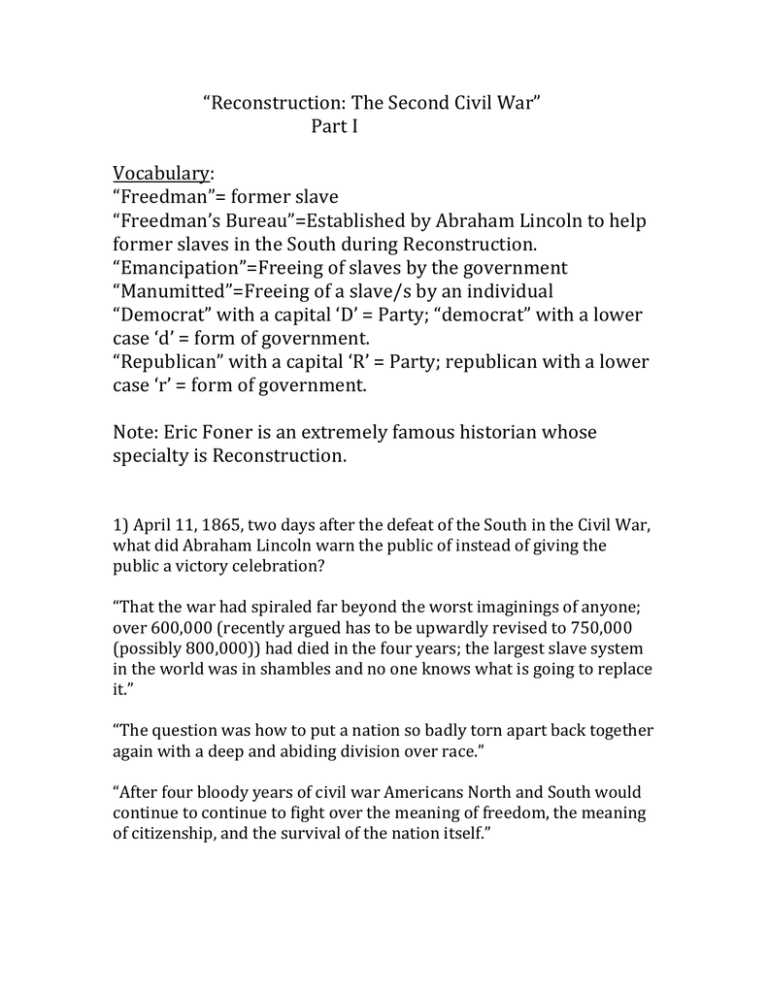
“Reconstruction: The Second Civil War” Part I Vocabulary: “Freedman”= former slave “Freedman’s Bureau”=Established by Abraham Lincoln to help former slaves in the South during Reconstruction. “Emancipation”=Freeing of slaves by the government “Manumitted”=Freeing of a slave/s by an individual “Democrat” with a capital ‘D’ = Party; “democrat” with a lower case ‘d’ = form of government. “Republican” with a capital ‘R’ = Party; republican with a lower case ‘r’ = form of government. Note: Eric Foner is an extremely famous historian whose specialty is Reconstruction. 1) April 11, 1865, two days after the defeat of the South in the Civil War, what did Abraham Lincoln warn the public of instead of giving the public a victory celebration? “That the war had spiraled far beyond the worst imaginings of anyone; over 600,000 (recently argued has to be upwardly revised to 750,000 (possibly 800,000)) had died in the four years; the largest slave system in the world was in shambles and no one knows what is going to replace it.” “The question was how to put a nation so badly torn apart back together again with a deep and abiding division over race.” “After four bloody years of civil war Americans North and South would continue to continue to fight over the meaning of freedom, the meaning of citizenship, and the survival of the nation itself.” “Before the Civil War the South would have been one of the five richest societies in the world.” Describe Kate Stone’s life during the Civil War: “It was a shock to many plantation owners that their slaves were not happy to work for them and were even angry with them.” Kate fears armed slaves: “what are they going to do to me given what we’ve done to them.” 2) To where did the Stones flee? 3) What did General William Tecumseh Sherman do? 4) As Sherman celebrated in a rich cotton plantation owner’s home dining on delicacies, who gathered in the thousands? “Lincoln’s ‘Emancipation Proclamation’ had freed slaves across the South but Washington still had no clear plan for what to do once African Americans were free.” 5) What did Secretary of War Stanton travel to Savannah for? How did they answer? “The freedom as I understand it, promised by the Emancipation Proclamation is taking from under the yoke of bondage and placing us where we could reap the fruit of our own labor.” Garrison Frasier “The best way to take care of ourselves is to have land, and we can soon take care of ourselves and have something to spare. We want to be placed on land until we can buy it and make it our own.” G.F. Sherman: Give them their rights. Protect their rights and let them alone to be citizens 6) What was “Special Field Order #15?” News of “40 acres and a mule” spread. 7) What happened at Appomattox Courthouse, Virginia on April 9th, 1865? “Conquered. Submission. Subjugation…are words that burn into my heart. The degradation seems more than we can bare “ I think [narrator] those words had particular significance in a white southern society that was fixated on honor. Honor and glory and independence were at the core of the white South’s understanding of itself, and in particular the understanding of what male southerners had to be men, what it meant to have “manhood.” Because who is conquered and subjugated: that’s a slave. The white South can only imagine that they have invoked God’s wrath in some way. What they could not understand was the idea of black people being their equal. Maybe slavery was meant to end but surely black people were not equal to white people. 8) What does “bottom rail’s on top this time massa?” mean? 9) What happened when Lincoln insinuated that some freedmen might get the right to vote? 10) Once Lincoln was dead what dilemma did the nation face? 11) What was “American” wrapped up in? The great questions of reconstruction: 1) Who will rule in the South? 2) Who will rule in the federal government? 3) What will the dimensions of black freedom be? No one was sure what to expect from the new president Andrew Johnson. He had fiercely opposed secession, the only southern senator to refuse to give up his seat in Congress. He blamed the big planters for the war. He championed the poorer whites. He owned a few slaves but he resented the plantation aristocracy. 12) Johnson shared the desire to punish some southerners but he shared their desire to do what? 13) How did Frederick Douglas feel about Johnson? 14) What happened in the sea islands of St. Catherine’s”? 15) Who was Marshall Twicham and what did he do? ***16) What was “Presidential Reconstruction?” “Johnson sets only the most minimal requirements. All they really have to do is admit ‘we lost the Civil War. The Civil War is over. Slavery and secession are dead. Other than that there are no requirements.” Eric Foner Planter aristocracy had to write his personally and beg for clemency. This basically eliminates the planter class from leadership of southern politics. If you’re not pardoned you can’t vote, you can hold office, and you can’t get your property back if it’s been seized by the federal government. Andrew Johnson had risen from poverty; Poor white southerners had far outnumbered slave-owners. Now he was anxious to protect them from what he saw as a new threat, black competition. 17) What was Andrew Johnson’s vision of the post-war South? 18) How did Thaddeus Stevens feel about slavery? 19) Who were “The Radical Republicans?” As the country waited for the inauguration scores of confederates descended upon Washington with petitions for pardons. “White man alone [told Johnson to one senator] must manage the South” 20) Back on St. Catherine’s Island freedmen occupied some 20 slave dwellings and grew crops. What did they want beyond this? Why was this so meaningful to them? Whites on the mainland watched with bitterness not just because the land had been seized from one of their own but because of their ambition and independence. 21) What happened in June of 1865? 22) What happened when Kate Stone returned? What did they mourn most? 23) What did white men want to make clear? They look around and cannot comprehend what has happened and what to do. They decide they must make it clear who is in control. Andrew Johnson looks around and sympathizes with them. He believes freedmen should return to their former places of work and above all accept their subordination to white power and authority. 24) What happened by fall of 1865? Why? 25) What did Johnson order in terms of Confederate lands confiscated during the war, including under Sherman’s Special Field Order? “You ask us to forgive the man who owned us of our island. The man who tied me to a tree and gave me 39 lashes, who stripped and flogged my mother and my sister, and will not let me stay in his empty hut except that I will do his planting and be satisfied with his price. That man I cannot well forgive” A farmer from St. Catherine’s Island 26) What happened in January of 1866? In Louisiana black farmers had leased over 10,000 acres from the Freedmen’s Bureau believing they would soon own them outright. Twitchel and other Freedman’s Bureau men delivered a message that no 40 acres and a mule was coming from this government. “Freedom from slavery is not freedom from work.” Marshal Twitcham Presidential Reconstruction was not going to give them land. Southerners and Northerners alike followed this. The road ahead was not going to be easy. There was great fear in the North and South that freedmen would not go back to the cotton fields. It was still the largest export in the United States; northerners were not willing to let African Americans stop growing cotton. 27) What was the freedman’s dream? 28) Why did white southerners dislike negotiating with freedmen? “There is now nothing between me and the nigger but the dollar, the almighty dollar, and I shall make out of him the most I can with the least expense.” South Carolina planter Freedmen who argued for better working conditions and wages were regularly met with threats and violence. Vigilantes lynched whole families and used the bullwhip on men and women as they had during slavery days. They wanted to create a system as close to slavery days as possible. In 1865 more than 2,000 black men, women, and children were reported in Louisiana alone. Systematic culling of black male leaders was systematic. The southern legal system became an instrument of legal intimidation. Louisiana, Texas, South Caroline, Mississippi and Florida passed laws that prohibited any work for African Americans except as field hands. The laws were called “black codes;” the aim was slavery without the chains. Some states made it illegal for freedmen to buy weapons or buy or lease land. Black children could be seized and forced to work in fields. If a black man had no job he could be jailed and auctioned to a planter for his labor. This was so severe Northern Republicans are faced with a dilemma: They don’t want a fight with the president but to give in meant accepting defeat in the Civil War. 28) What dilemma did southern women face after the war? 29) What happened in December, 1865? How did many northerners feel about this? The 39th Congress, the first since the end of the Civil War convened. More than 60 former confederates prepared to take their seats, including four generals, four colonels, and six Confederate cabinet officers. Even Alexander H. Stephens, the former vice president of the Confederacy took his place. For many northerners it seemed like the war had been fought in vain. On the opening day the clerk of the House declined to announce the southern confederate delegates and sent them packing. The war over Reconstruction had begun. They were literally fighting over the meaning of the war they had just fought. “In many ways Congress was a poisoned atmosphere in the debates over the Reconstruction policy. There were raw war memories being played out. There were visceral hatreds being played out on the floor of Congress between Republicans and Democrats. These debates are between men who have experienced this war, who have fought this war. They are fighting literally about the meaning of that conflict they had just fought. Northern Democrats sided with Johnson and railed against Republicans across the aisle. Washington must get out of the way they insisted, and let southerners run their own affairs.” Eric Foner “The Democrats had always identified themselves as the party of the white man. It very explicitly said, “We are here to protect the rights of white men North and South, and how do we do that? We hold the Union together. For that reason Democrats saw themselves as trying to put the North and South together as quickly as possible during the Civil War, and as soon as it’s over trying to knit North and South together at the expense of black men. Edward L. Ayers (Historian) 30) How did Thaddeus Stevens respond? “Do not I pray you admit those have slaughtered a half-million of our countrymen until their clothes are dried, and until they are reclad. I do not wish to sit side by side with men whose garments smell of the blood of my kindred.” It was Stevens’ way of saying we’re going to keep the South out of the Union as long as we can, and we’re not going to allow anybody back in here who was responsible for making the war. 31) What did the Congressional Committee on Reconstruction conclude? 32) What did Congress do in March of 1866? “Moderate Republicans are forced into the radical camp because they had to oppose Andrew Johnson. Johnson’s plan of Reconstruction was so lenient in utter contempt of black liberty that it was simply unacceptable. ****33) Republicans feared that this was not enough. What did they do? What became the origin of the concept of civil rights in American society? 34) What happened on July 30, 1866 in New Orleans? White mob chased radical Republicans out of their convention; three white radicals killed and 34 black men murdered. 35) What happened that fall in the elections to Congress? ****36) What happened in March? Again overrode veto. Former Confederate States divided into five military districts, each commanded by a general with power to enforce law and administer justice. New southern governments would be created and have to ratify the 14th Amendment; their new state constitutions would have to be approved by Congress and black men would have the right to vote. It was the first large-scale experiment in interracial democracy anywhere. *Take special note to the ending… ***Andrew Johnson was impeached for high crimes and misdemeanors but survived conviction by one vote. When radical Reconstruction passed there were still 38,000 federal troops stationed in the South. In Louisiana more than half were black. “From the point of view of the white southerner the Civil War was a tragic mistake. They had defended only what they had understood to be their constitutional rights. It was not that they had disrupted the Union, engaged in an act of treason. They felt that the North was a viscous aggressor committed to a perversion, which was black equality. This sense of a grievance, and sense of injustice only grew, that this was something that was not to be accepted.” Clarence E. Walker (Historian)
